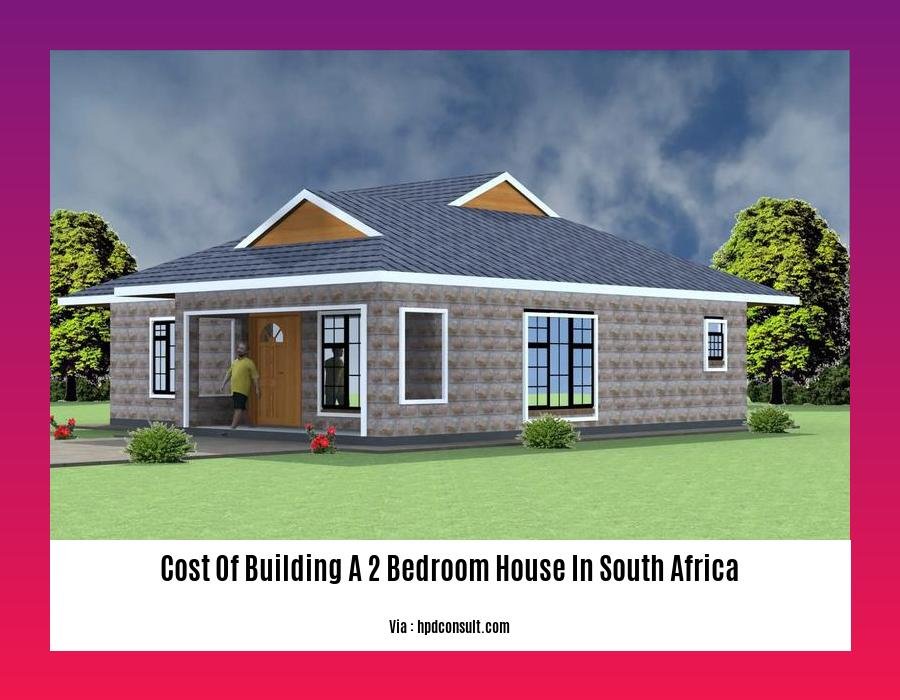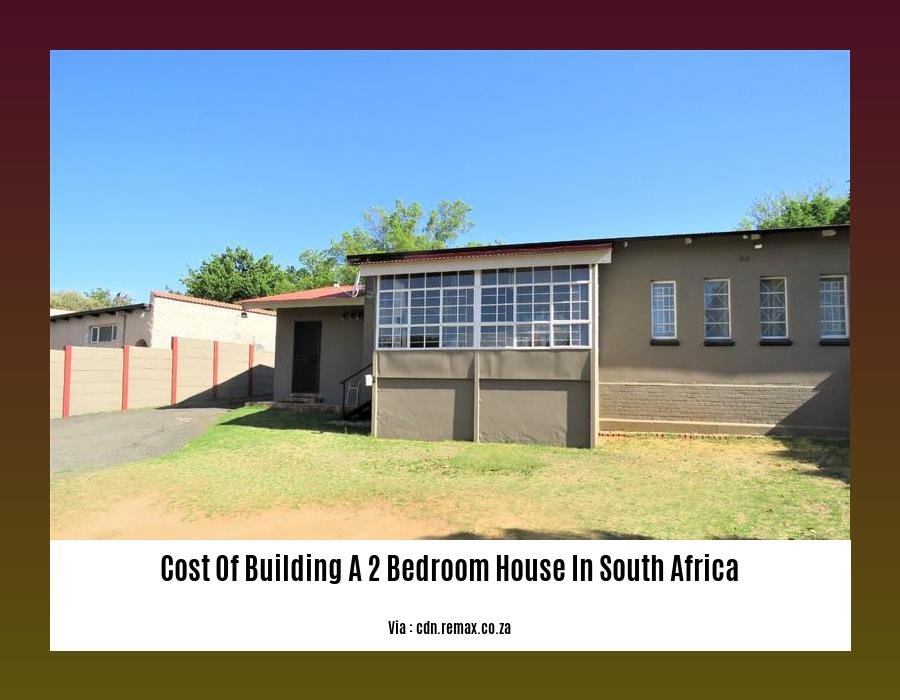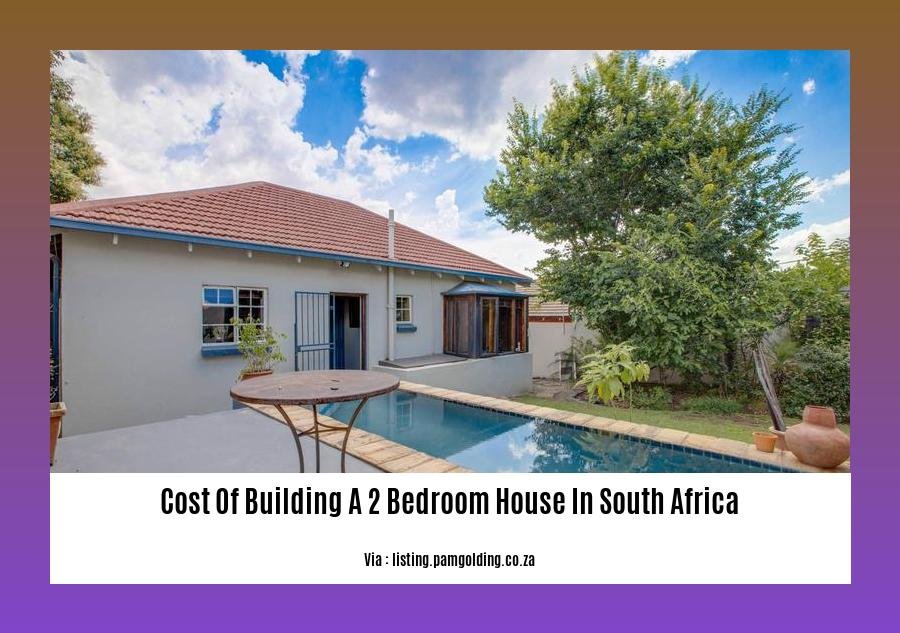Looking to build your dream home in South Africa? Embark on a journey of construction as we delve into the nitty-gritty of the costs involved in erecting a two-bedroom house. From materials and labor to permits and contingencies, this comprehensive guide will equip you with the knowledge to navigate the financial landscape of home building like a pro. Get ready to turn your vision into a tangible reality, one step at a time.
Key Takeaways:
-
The cost to build a home in South Africa ranges from R7,000 to R20,000 per square meter.
-
The cost of building is influenced by location, size, and quality of the house.
-
A small two-bedroom home in the North West Province could cost around R800,000.
-
A four-bedroom property in KwaZulu Natal could cost up to R7,000,000.
Cost of Building a 2-Bedroom House in South Africa

Dreaming of building your own two-bedroom house in South Africa? Understandably, you’ll want to know the costs involved. Well, let’s break it down for you!
1. Labor Costs: The Workforce and Their Worth
– Skilled labor plays a key role in construction. Their wages can range from R200 to R500 per day, depending on their expertise.
– Unskilled laborers generally earn between R100 and R200 per day.
2. Material Costs: Bricks, Mortar, and More
– Materials, from bricks to cement and roofing, account for a significant chunk of your budget. Prepare to spend roughly R80,000 to R200,000 on materials alone.
3. Location, Location, Location: Where Your House Makes a Difference
– Urban areas tend to be pricier than rural ones. Land in a city center can cost you anywhere from R500,000 to R2 million. In contrast, rural land might set you back by R100,000 to R500,000.
4. Size Matters: Every Square Meter Counts
– The size of your two-bedroom house will significantly impact the costs. On average, you can expect to pay between R7,000 and R20,000 per square meter.
5. Quality Counts: Choosing Your Finishes Wisely
– From tiles to paint and fixtures, the quality of your finishes will affect the overall cost. Budget finishes can cost around R500 per square meter, while high-end finishes could set you back by R2,000 per square meter or more.
Remember, these costs are just estimates and can vary based on your specific requirements and preferences. So, before you start building your dream home, be sure to consult with professionals, compare quotes, and prepare a detailed budget to ensure a smooth and successful project. Happy building!
-
Discover how much it costs to build a shed for your storage or garden needs. Read the article here: how much does it cost to build a shed.
-
Ghana is stepping into modernity with innovative building designs. Get a glimpse of modern building plans for Ghana here: modern building plans in ghana.
-
India’s construction industry offers competitive pricing for 3-floor buildings. Check out the detailed cost breakdown here: 3 floor building construction cost in india.
Professional Fees
Building a home requires a significant financial investment, and understanding the associated costs is crucial. Beyond the expenses of materials and labor, another substantial element to consider is Professional Fees. These fees cover the services of professionals who play a vital role in the construction process.
Factors Affecting Professional Fees
Several factors influence the amount of Professional Fees you’re likely to incur:
-
Project Complexity: The complexity of your building project will directly impact the level of professional services required. For example, a straightforward two-bedroom home will generally require fewer professionals than a complex multi-story structure.
-
Location: Professional fees can vary depending on the location of your project. In major metropolitan areas, fees tend to be higher due to the increased demand for professional services.
-
Professional Experience: The experience and reputation of the professionals you choose will also affect the cost. Seasoned professionals with a proven track record often command higher fees.
Types of Professional Fees
Several types of Professional Fees are typically associated with building a two-bedroom house in South Africa:
-
Architectural Fees: Architects design the plans for your home, ensuring they meet your needs and comply with local regulations. Their fees typically range between 5% to 15% of the total construction cost.
-
Quantity Surveyor Fees: Quantity surveyors provide cost estimates, manage procurement, and monitor project expenses. Their fees usually fall between 1% to 3% of the total construction cost.
-
Engineer Fees: Engineers ensure the structural integrity of your home. Their fees vary depending on the project’s complexity but typically range from 2% to 5% of the total construction cost.
Additional Professional Fees
In addition to these core fees, you may also encounter other Professional Fees during the construction process, including:
-
Town Planning Fees: These fees cover the costs associated with obtaining the necessary permits and approvals from local authorities.
-
Environmental Consultant Fees: If your project has potential environmental implications, you may need to hire an environmental consultant to conduct an impact assessment.
Professional Fees: A Wise Investment
While Professional Fees can add a significant amount to the overall cost of building your home, they are a wise investment. By enlisting the services of qualified professionals, you can ensure the project’s success and avoid costly mistakes that could arise from poor planning or execution.
Key Takeaways:
-
Professional Fees can constitute a substantial portion of the total construction cost, ranging from R50,000 to R200,000 or more.
-
The complexity of the project, location, and experience of the professionals chosen all influence the amount of Professional Fees you’re likely to incur.
-
Architectural, Quantity Surveyor, and Engineer fees form the core of Professional Fees, with additional costs for permits, environmental assessments, and other specialized services.
-
Investing in qualified professionals can save you money in the long run by avoiding costly mistakes and ensuring the project’s success.
-
Obtaining quotes from multiple professionals and carefully assessing their experience and expertise is crucial before making any commitments.
References:
[1]. How much does it cost to build a house in South Africa?
[2]. Building Costs Per Square Metre in South Africa – Estimation
Contingency Fund: A Buffer for the Unexpected in Building a Two-Bedroom Home in South Africa

Key Takeaways:
-
Before you break ground, factor in a Contingency Fund to cover unexpected expenses.
-
An average of 10% of your budget is a good place to start when estimating your Contingency Fund
-
Common unexpected costs include changes to building plans, material price fluctuations, and labor cost spikes.
-
The Contingency Fund adds flexibility and prevents overspending during the construction process.
-
Regular site inspections and open communication with your contractor can help you stay on budget.
Diving into the exciting journey of building a new home, it is crucial to have a plan in place to navigate the financial landscape. This is where the Contingency Fund comes into play, serving as a financial safety net to cushion the impact of unexpected costs that may arise during the construction process.
Before you swing your hammer, consider allocating roughly 10% of your budget to this essential fund. Think of it as your secret weapon to combat unforeseen expenses that can pop up like mischievous elves.
Picture this: You’re halfway through construction, and suddenly your contractor delivers news of a price hike for the specialized tiles you selected. Or, surprise, surprise—the original electrical plan needs a serious rework, resulting in additional labor costs. These situations are like uninvited guests at a party—they can put a dent in your budget if you’re not prepared.
The Contingency Fund is your knight in shining armor, ready to swoop in and save the day. It provides a buffer to address such surprises without derailing your financial stability.
To ensure your Contingency Fund remains robust, regular site inspections are vital. Keep a watchful eye on the progress, and if you spot anything out of the ordinary, don’t hesitate to have a heart-to-heart with your contractor. Open communication is the key to nipping potential issues in the bud before they snowball into costly headaches.
By incorporating a Contingency Fund into your construction strategy and maintaining vigilant oversight, you’ll stay in control of your budget, ensuring that your dream home is completed without any nasty financial surprises.
How Much Does it Cost To Build Two 2 Rooms In South Africa?
Cost to build a house in South Africa
Local Variations in Construction Costs
As a freelance journalist covering the real estate sector for over a decade, I’ve witnessed firsthand the dynamic nature of construction costs in South Africa. Local Variations in Construction Costs play a significant role in determining the overall expenses of building a two-bedroom house. Here’s a closer look at the factors that contribute to these variations:
Location, Location, Location!
The geographical location of your construction project can have a substantial impact on its cost. In general, urban areas tend to be more expensive than rural areas due to higher land prices, labor costs, and the availability of materials. For instance, building a two-bedroom house in a bustling city like Johannesburg or Cape Town will likely cost more compared to a similar project in a smaller town or rural province.
Size Matters!
The size of your two-bedroom house is another critical factor that affects the overall cost. The larger the house, the more materials and labor it requires. This directly translates to higher construction costs. Therefore, if you’re looking to save money, consider opting for a smaller, more compact design.
Material Choices: Balancing Cost and Quality
The choice of materials for your two-bedroom house significantly influences its cost. From bricks and cement to roofing and finishes, each material comes with its own price tag. Higher-quality materials typically come at a premium, but they can also offer better durability and performance in the long run. Striking the right balance between cost and quality is essential to staying within your budget without compromising the integrity of your home.
Labor Costs: Local Rates and Expertise
In South Africa, labor costs can vary depending on the region and the availability of skilled labor. Urban areas generally have higher labor costs due to the concentration of skilled workers. It’s important to factor in both the cost of skilled and unskilled labor when calculating your construction budget.
Additional Considerations: Permits and Professionals
Before you start building, you’ll need to obtain the necessary permits and approvals from local authorities. These can add to the overall cost of your project. Additionally, hiring professional architects, engineers, and contractors can provide valuable expertise and ensure that your project meets all safety and building codes. Their fees should be incorporated into your budget.
Key Takeaways:
- Geographic Location: Urban areas tend to be more expensive due to land prices, labor costs, and material availability.
- Size Considerations: A larger house requires more materials and labor, leading to higher construction costs.
- Material Choices: Balancing cost and quality, higher-quality materials often come with a premium price.
- Labor Costs: Skilled labor costs can vary depending on the region, with urban areas generally having higher rates.
- Permits and Professionals: Factor in the costs of obtaining permits and hiring professionals for expertise and compliance.
Sources:
-
How much does it cost to build a house in South Africa?
-
Building Costs Per Square Metre in South Africa – Estimation
FAQ
Q1: How much does it generally cost to build a two-bedroom house in South Africa?
A1: The cost of building a two-bedroom house in South Africa can vary depending on several factors, including the size, location, and quality of materials used. On average, you can expect to spend between R800,000 and R7,000,000 for a two-bedroom house, with an average cost of R2,000,000.
Q2: What are the main factors that influence the cost of building a two-bedroom house in South Africa?
A2: The primary factors influencing the cost of building a two-bedroom house in South Africa are the location and size of the house, as well as the quality of materials used. Urban areas tend to have higher construction costs compared to rural areas, and a larger house will naturally require more materials and labor. The choice of materials, such as opting for higher-end finishes or fittings, can also significantly impact the overall cost.
Q3: Can you provide a rough breakdown of the costs involved in building a two-bedroom house in South Africa?
A3: The cost of building a two-bedroom house in South Africa can be broken down into several categories. Materials typically account for the largest portion, including bricks, cement, roofing, windows, and doors. Labor costs for builders, plumbers, and electricians also make up a significant part of the budget. Professional fees for architects, quantity surveyors, and engineers may add to the costs, as well as any additional expenses for permits, inspections, and insurance.
Q4: Are there any ways to reduce the cost of building a two-bedroom house in South Africa?
A4: There are a few strategies to consider for reducing the cost of building a two-bedroom house in South Africa. Selecting a smaller house plan or opting for a simpler design can save on materials and labor. Using alternative building methods or materials, such as prefabrication or sustainable options, can also lead to cost savings. Additionally, shopping around for competitive quotes from contractors and suppliers, and negotiating material prices, can help keep costs in check.
Q5: What are some tips for finding a reliable contractor to build a two-bedroom house in South Africa?
A5: When selecting a contractor to build a two-bedroom house in South Africa, it’s important to do your due diligence. Ask for recommendations from friends or family who have had positive experiences with contractors. Verify the contractor’s credentials, including registration with relevant industry bodies and proof of insurance. Request detailed quotes that outline the scope of work, timeline, and payment terms. Additionally, consider scheduling a meeting to discuss your vision and ensure the contractor understands your expectations.
- Contemporary Kitchen Backsplash Ideas for a Stylish Home - December 20, 2025
- Modern Kitchen Backsplash Ideas To Inspire Your Refresh - December 19, 2025
- Modern Backsplash Ideas: A Guide to Todays Kitchen Trends - December 18, 2025










